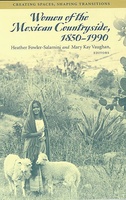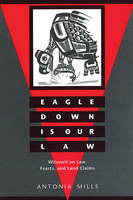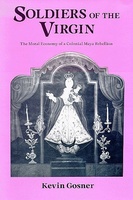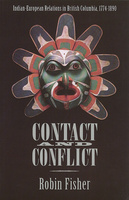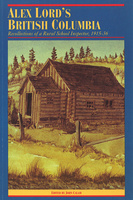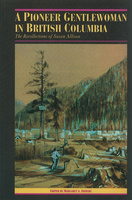A Thousand Blunders
The Grand Trunk Pacific Railway and Northern British Columbia
A provocative account of one of the greatest entrepreneurial failures in Canadian history, this book documents the downfall of the Grand Trunk Pacific Railway, which helped develop the north-central corridor of British Columbia – then collapsed dramatically in 1919.
Paul Kane's Great Nor-West
In this beautifully designed and richly illustrated book, Diane Eaton and Sheila Urbanek re-create Paul Kane's heroic journey across Canada and bring to life the people, places, and events he experienced.
Taking Control
Power and Contradiction in First Nations Adult Education
A critical ethnography of the Native Education Centre in Vancouver, British Columbia.
Britain and the Origins of Canadian Confederation, 1837-67
Ged Martin offers a sceptical review of claims that Confederation answered all the problems facing the provinces, and examines in detail British perceptions of Canada and ideas about its future.
Women of the Mexican Countryside, 1850-1990
Too often in the history of Mexico, women have been portrayed as marginal figures rather than legitimate participants in social processes. As the twentieth century draws to a close, Mexican women of the countryside can be seen as true historical actors: mothers and heads of households, factory and field workers, community activists, artisans, and merchants. In this new book, thirteen contributions by historians, anthropologists, and sociologists--from Mexico as well as the United States--elucidate the roles of women and changing gender relations in Mexico as rural families negotiated the transition from an agrarian to an industrial society.
Drawing on Mexican community studies, gender studies, and rural studies, these essays overturn the stereotypes of Mexican peasant women by exploring the complexity of their lives and roles and examining how these have changed over time. The book emphasizes the active roles of women in the periods of civil war, 1854-76, and the commercialization of agriculture, 1880-1910. It highlights their vigorous responses to the violence of revolution, their increased mobility, and their interaction with state reforms in the period from 1910 to 1940. The final essays focus on changing gender relations in the countryside under the impact of rapid urbanization and industrialization since 1940.
Because histories of Latin American women have heretofore neglected rural areas, this volume will serve as a touchstone for all who would better understand women's lives in a region of increasing international economic importance. Women of the Mexican Countryside demonstrates that, contrary to the peasant stereotype, these women have accepted complex roles to meet constantly changing situations.
CONTENTS
IWomen and Agriculture in Nineteenth-Century Mexico
1. Exploring the Origins of Democratic Patriarchy in Mexico: Gender and Popular Resistance in the Puebla Highlands, 1850-1876, Florencia Mallon
2. "Cheaper Than Machines": Women and Agriculture in Porfirian Oaxaca (1880-1911), Francie R. Chassen-López
3. Gender, Work, and Coffee in C¢rdoba, Veracruz, 1850-1910, Heather Fowler-Salamini
4. Gender, Bridewealth, and Marriage: Social Reproduction of Peons on Henequen Haciendas in Yucatán (1870-1901), Piedad Peniche Rivero
IIRural Women and Revolution in Mexico
5. The Soldadera in the Mexican Revolution: War and Men's Illusions, Elizabeth Salas
6. Rural Women's Literacy and Education During the Mexican Revolution: Subverting a Patriarchal Event?, Mary Kay Vaughan
7. Doña Zeferina Barreto: Biographical Sketch of an Indian Woman from the State of Morelos, Judith Friedlander
8. Seasons, Seeds, and Souls: Mexican Women Gardening in the American Mesilla (1900-1940), Raquel Rubio Goldsmith
IIIRural Women, Urbanization, and Gender Relations
9. Three Microhistories of Women's Work in Rural Mexico, Patricia Arias
10. Intergenerational and Gender Relations in the Transition from a Peasant Economy to a Diversified Economy, Soledad González Montes
11. From Metate to Despate: Rural Women's Salaried Labor and the Redefinition of Gendered Spaces and Roles, Gail Mummert
12. Changes in Rural Society and Domestic Labor in Atlixco, Puebla (1940-1990), Maria da Glória Marroni de Velázquez
13. Antagonisms of Gender and Class in Morelos, Mexico, JoAnn Martin
The Klondike Stampede
This classic in Yukon gold rush literature was originally published in 1900 and has long been out of print.
Objects of Concern
Canadian Prisoners of War Through the Twentieth Century
Jonathan Vance examines Canada's role in the formation of an important aspect of international law, traces the growth and activities of a number of national and local philanthropic agencies, and recounts the efforts of ex-prisoners to secure compensation for the long-term effects of captivity.
Houses for All
The Struggle for Social Housing in Vancouver, 1919-1950
This is the story of the struggle for social housing in Vancouver between 1919 and 1950.
Gold at Fortymile Creek
Early Days in the Yukon
Michael Gatesfollows the first gold-seekers from their arrival in 1873 until the stampede to the Klondike in 1896, capturing the essence of these early years of the gold rush and chronicling the trials and successes of the hardy individualists who searched for gold in the wilderness.
Eagle Down Is Our Law
Witsuwit'en Law, Feasts, and Land Claims
The struggle of the Witsuwit'en peoples to establish the meaning of aboriginal rights.
Decision at Midnight
Inside the Canada-US Free-Trade Negotiations
This is the story of the 1988 Free Trade Agreement negotiations between Canada and the US, the preparations for and conduct of the negotiations, as well as the ideas and issues behind them.
Indigenous Peoples of the World
Their Past, Present and Future
A comprehensive survey of the Indigenous Peoples of the world, including who they are, where they live, and similarities in their history and future challenges.
Ships and Memories
Merchant Seafarers in Canada's Age of Steam
An account of life on steamships, this book draws on the experiences of seafarers in peace and war and during the depression.
Bitter Feast
Amerindians and Europeans in Northeastern North America, 1600-64
The first book to pay serious attention to the European economic and political factors which promoted colonization, this book argues that the prime determinant was the uneven development of agricultural systems in western Europe.
Soldiers of the Virgin
In the early summer of 1712, a young Maya woman from the village of Cancuc in southern Mexico encountered an apparition of the Virgin Mary while walking in the forest. The miracle soon attracted Indian pilgrims from pueblos throughout the highlands of Chiapas. When alarmed Spanish authorities stepped in to put a stop to the ...
Thomas Crosby and the Tsimshian
Small Shoes for Feet Too Large
Clarence Bolt demonstrates that the Aboriginal peoples of Canada were conscious participants in the acculturation and conversion process -- as long as this met their goals.
The Struggle for Social Justice in British Columbia
Helena Gutteridge, the Unknown Reformer
The Early Years of Native American Art History
The Politics of Scholarship and Collecting
This collection of essays deals with the development of Native American art history as a discipline.
Kwakiutl String Figures
Kwakiutl String Figures will interest students of comparative cultures and will delight all who have time (and string) on their hands.
Contact and Conflict
Indian-European Relations in British Columbia, 1774-1890 (2nd edition)
Originally published in 1977, Contact and Conflict has inspired numerous scholars to examine further the relationships between the Indians and the Europeans – fur traders as well as settlers.
The Railway King of Canada
Sir William Mackenzie, 1849-1923
A dramatic biography of the now-forgotten Canadian entrepreneur, who spearheaded the most technologically advanced projects ever undertaken in the country, and built a business empire that stretched to Brazil, but was virtually bankrupt by the time of this death.
Life Lived Like a Story
Life Stories of Three Yukon Native Elders
The life stories of three remarkable and gifted women of Athapaskan and Tlingit ancestry who were born in the southern Yukon Territory around the turn of the century - when storytelling provides a customary framework for discussing the past.
Alex Lord's British Columbia
Recollections of a Rural School Inspector, 1915-1936
These memoirs invite the reader to experience the British Columbia that Alex Lord knew. Through his words, we endure the difficulties of travel in this mountainous province.
Aboriginal Peoples and Politics
The Indian Land Question in British Columbia, 1849-1989
This book presents the first comprehensive treatment of the land question in British Columbia and is the first to examine the modern political history of British Columbia Indians.
The Curtain Within
Haida Social and Mythical Discourse
Explores the management of social roles and symbols to achieve various goals by people living in a modern Haida community.
Robert Brown and the Vancouver Island Exploring Expedition
The remarkable journal of the 1864 Vancouver Island Exploring Expedition, a four-and-a-half-month journey that describes the island's pristine wilderness, as well as Cowichan, Chemainus, and Comox and the coal-mining town of Nanaimo.
Chiefs of the Sea and Sky
Haida Heritage Sites of the Queen Charlotte Islands
Presents an overview of extensive research carried out by archeologist George MacDonald in the 1960s and 1970s to document the history of the Haida villages of the Queen Charlotte Islands.
A White Man's Province
British Columbia Politicians and Chinese and Japanese Immigrants 1858-1914
A revealing historical account of the complex racism in early British Columbia and the lives and contributions made to the province by its Chinese and Japanese residents.



